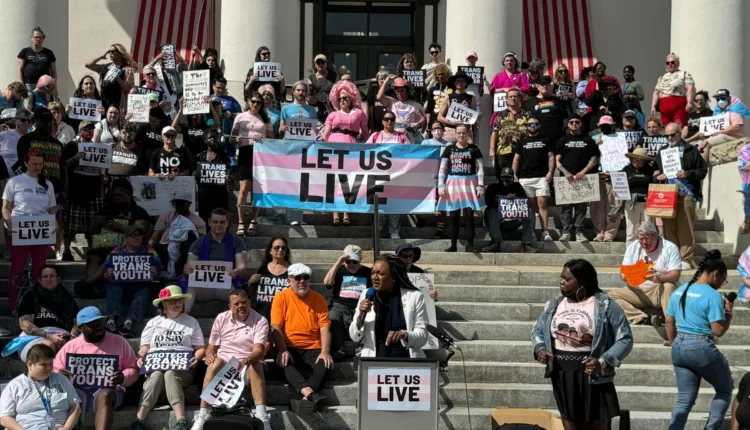
Trans Individuals Face ID Restrictions in Proposed Florida Law
TL/DR –
Over a hundred activists gathered at the Florida State Capitol to protest anti-LGBTQ+ legislation, particularly House Bill 1639, which would prevent residents from having accurate gender markers on their state identification cards. The bill, which is up for a vote, would require individuals to list their sex assigned at birth on their identification cards, affecting approximately 95,000 transgender adults and 16,200 transgender youth aged 13-17 residing in Florida. The bill also contains measures that would require health insurance companies to cover treatment to detransition, and it has been heavily criticized by LGBTQ+ advocates and allies who claim it is part of a series of targeted attacks against the community.
Florida Anti-LGBTQ+ Legislation Sparks Protest
On Wednesday, over a hundred activists rallied at the Florida State Capitol in Tallahassee against anti-LGBTQ+ legislation, including a proposed bill barring residents from having accurate gender markers on their state identification cards.
The bill in question, House Bill 1639, is set for a House vote on Thursday. It builds on a January memo from the Florida Department of Highway Safety and Motor Vehicles barring Floridians from updating their gender markers on state identification documents.
The proposed legislation mandates individuals to list their sex assigned at birth on their IDs, and would affect those applying for their first ID or license. This bill could impact around 95,000 transgender adults and 16,200 transgender youth aged 13-17 residing in Florida, according to the Williams Institute at UCLA’s School of Law.
The bill’s enforcement parameters are unclear, leading to widespread opposition from LGBTQ+ advocates and allies. Kara Gross, legislative director of the ACLU of Florida, questioned if the legislation would require gender proof at traffic stops.
House Bill 1639 intends to replace references to gender with sex in section 322, which details how residents can obtain a state identification card. If passed, state IDs would reflect an individual’s sex assigned at birth instead of their gender identity. These rules would take effect on July 1.
The bill also includes measures that could impact health insurance coverage for sex-reassignment prescriptions, and therapeutic services for individuals with perceptions of sex inconsistent with their birth sex. According to the ACLU of Florida, these measures might endorse conversion therapy and create hurdles for gender-affirming care coverage.
Protests against the bill stem from claims that it is part of a broader attack on LGBTQ+ rights. Over 10 anti-LGBTQ+ bills have been filed in the current Florida legislative session, the ACLU’s legislative tracker shows. The bill also faces criticism for potentially denying legal recognition to transgender individuals.
The proposed legislation, together with the Florida Department of Highway Safety and Motor Vehicles memo, could force transgender Floridians applying for their first state ID to list their assigned sex at birth. This has sparked reactions such as Simone Chriss, the director of the transgender rights initiative at the Southern Legal Counsel, who suggested the law’s proposed enforcement is unclear.
—
Read More Health & Wellness News ; US News
